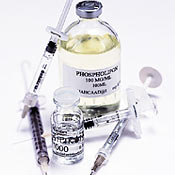 |
(Photo: Eric Piasecki) |
Steven Victor has always kept his office stocked with the finest array of body-perfecting, youth-prolonging equipment and technologies a cosmetic dermatologist could desire. Some things, like the microwave hair-removal machine, went out the door as quickly as they came in. So a few people temporarily had grid marks across their bikini areas—hey, that’s the price of experimentation. But no one can say Victor’s not in the vanguard. Sitting in a chair in his office overlooking Madison Avenue, he brushes back his shoulder-length white hair and grouses about his profession’s current imbroglio.
“By the time Restylane gets approved here, nobody will be using it in Europe anymore,’’ he says. “People have been using it in the U.S. for four years and in other countries for nine. We’ve been hearing forever that it’s getting approved by the FDA any day.’’
Victor’s patients are a savvy and demanding lot who are almost as up on trendy beauty innovations as he is. Why, he asks, should he have to wait for the FDA to approve something that’s already widely available to patients in Europe?
His focused expression shoots into a wide smile as he plays with a fresh vial of what he claims is the hottest new wrinkle eliminator. “Matridex fills instantly and loses only between 30 and 50 percent of its correction, while Restylane dissipates in six to nine months. That’s pretty cool.’’
Matridex is even further away from being approved than is Restylane; in fact, it hasn’t yet been presented to the Food and Drug Administration. But that isn’t stopping Victor from using it. And he’s not alone.
Though not all of them will discuss it openly, a startling number of cosmetic doctors in the city are using methods and medicines that are not approved for cosmetic purposes in the U.S. Yet these same substances are widely embraced in Europe and South America—the cradles of cosmetic surgery. Many American doctors increasingly see themselves as part of the international community, and resent the lumbering FDA-approval process. While there is deep disagreement over the ethics and safety of using unapproved products, the demand for youth-enhancing substances is so high that there’s a constant hunt for new and improved fillers that last longer and look more natural than old-style injectables like collagen. And, prompted by the clamor from patients for the hottest new products, many doctors are happily administering them.
“We get these things because they are the best,” says Victor. “It’s not like we’re making them in the bathroom or the basement,” he adds. “We get them from international pharmaceutical companies. Am I breaking the law? It’s a gray zone."
Physicians justify this position by invoking what they call the “standard of care”—the idea that if many doctors engage in the same treatment, it becomes ethically legitimized. They finesse the lack of FDA approval in two ways.
One is to use cosmetically a substance that has been approved only for a medical use. This is called “off-label,” and it’s legal. Botox, originally approved for relieving eye twitches, was used off-label for years before it was approved in 2002 as a wrinkle relaxer—though only for the glabellar lines, the furrowed frown between the eyes. Levulan, FDA-approved to treat precancerous growths, is being used for hair removal and to combat photoaging; hypertonic saline solution, used to induce abortion, is being injected into unsightly veins; and liquid silicone, which is approved for treating detached retinas, is being used as a permanent filler, even though it has been known to migrate from the injection site and cause hard granulomas, or bumps, under the skin.
The other way doctors detour the issue of FDA approval is to use drugs that haven’t even been presented to the agency for consideration.
To hear some doctors tell it, client demand pushes physicians to experiment with unapproved treatments. “There’s a new kind of patient out there,” says Stephen Bosniak, an ophthalmic plastic surgeon at New York Eye & Ear Infirmary. “They come in asking for these things. In this competitive market, people want to be the first to offer something new, because it is exciting.”
But Thomas Romo III, director of facial, plastic, and reconstructive surgery at Lenox Hill Hospital and an officer of several peer societies in New York, is of the opinion that doctors shouldn’t use unapproved treatments. “Either we respect the laws or we don’t,” he argues. “We’ve just come out of Wall Street and banking scandals where people were breaking the law and everyone winked at it—a societal process which has already ruined one industry. When the FDA says something is not approved at all, it’s not ‘sort of’ against the law if you use it, it is against the law.”